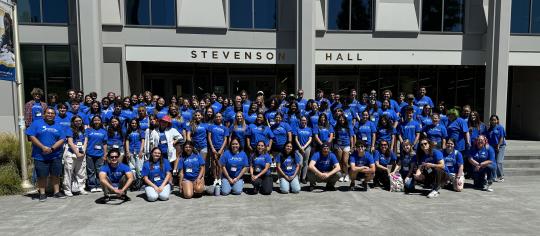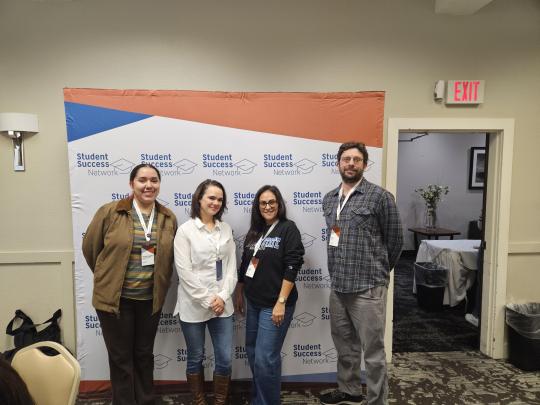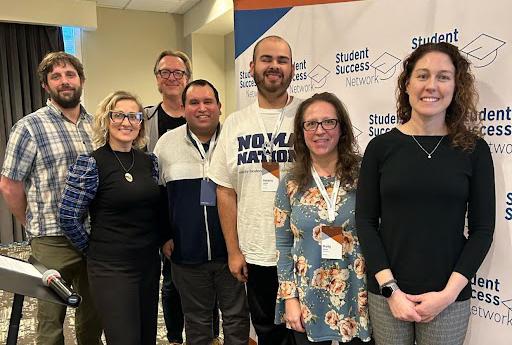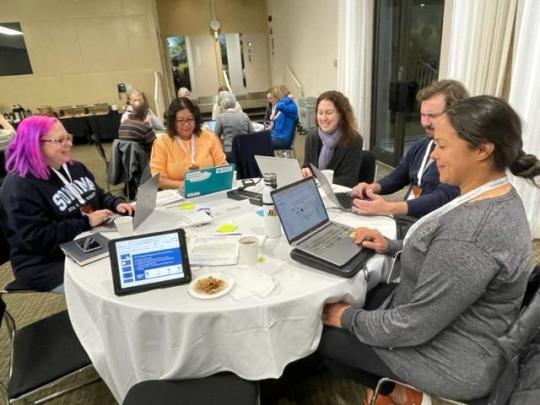Initiatives & Projects
Implementation of General Education (GE) Program Changes
Overview
In response to Assembly Bill 928 and corresponding updates to EO 1100, the California State University (CSU) system will introduce revised General Education (GE) program requirements beginning Fall 2025. These updates apply to all first-time, first-year students and establish a single GE transfer pathway across the CSU and UC systems. To ensure a smooth and effective transition, Academic Programs has collaborated closely with faculty and campus partners to lead the implementation of these changes, including:
- Redesigning two-year and four-year advising plans
- Updating course content and curricular requirements
- Revising the University Catalog and PeopleSoft program/course descriptions
- Enhancing advising tools and providing faculty/staff training workshops
Support & Resources
To support faculty, staff, and students during this transition, the following resources are available:
- 📄 One-Page Guide: A quick comparison of the current GE program and the upcoming Fall 2025 structure
- ❓ New GE Programs FAQS
- 📊 Training Slide Deck: Overview of the new GE requirements and how they impact curriculum and advising
- 🕸️GE Subcommittee Website: GE learning outcomes and resources for adding a course to the GE program
- 💬 Drop-In Office Hours (with snacks in-person!):
- Thursday, April 3 | 1–2 PM [➕ Add to Calendar]
- Wednesday, April 9 | 10–11 AM [➕ Add to Calendar]
- Monday, April 14 | 1–2 PM [➕ Add to Calendar]
- Tuesday, April 22 | 10–11 AM [➕ Add to Calendar]
Join us in person (W&B) or on Zoom to ask questions, get clarity, and collaborate on implementation.
Arts Integration Program
Sonoma State University’s Arts Integration Program offers opportunities for students and faculty from any discipline to engage in a variety of artistic experiences that complement and integrate with academic programs. These activities aim to foster creativity, critical thinking, an exploration of diverse ideas, and inspire understanding through exposure to cultures outside of one's own.
Guided by our core values, the Green Music Center, Academic Programs, and university performing and visual arts departments partner to provide our campus communities with access to resources and tools that support interdisciplinary collaborations and innovative programs.
Seawolves F1rst Supportive Pathways
The Seawolves F1rst Initiative supports incoming first-time first-year students in transitioning smoothly from high school to college, ensuring success in English and math coursework during their first year. This initiative replaces the previous CSU Early Start Program.
Seawolves F1rst Goals:
Aim #1: Administrative & Co-curricular Support

- Strategic scheduling, assessments, and block enrollment in learning cohorts
- Support for faculty teaching multi-section courses
- Collaborative partnerships for holistic student support
- Pre-arrival community-building and skill-building activities
Aim #2: Faculty & Peer Support Professional Development
- Faculty learning communities focused on culturally responsive pedagogy
- Ongoing course improvements with shared curriculum
- Training to strengthen faculty-peer mentor partnerships
Jump Start
The Jump Start program helps incoming first-year students build essential academic skills, engage in pre-term workshops, connect with peers, and adjust to campus life before the semester starts. Room, board, and all necessary supplies are provided.
Before Fall 2024, 100 students participated in Sea Wolves F1rst Jump Start, which included community-building and academic workshops and a session by Dr. Chiara Bacigalupa on navigating college. Dr. Bacigalupa's book, College YOU Get Much More Out of College, was incorporated into first-year curriculum. Data shows the program helped students:
- Navigate campus effectively
- Feel prepared for the first day of class
- Access support services like tutoring and advising
- Communicate confidently with professors
- Develop effective study and time management strategies
Want to get involved? Contact [email protected]
Are you a student looking to apply to Jump Start?
Faculty Teaching and Learning Communities
In support of the CSU Chancellor’s Office Equity Initiatives and Seawolves F1rst, Academic Programs led four faculty Teaching and Learning Communities (TLCs) over the course of the 2023-2024 academic year.
First-year Learning Community Faculty TLC: Faculty teaching in first-year learning communities (FLCs) met monthly to discuss the background, skills, and needs of first-time first-year students in an effort to build collaboration and community across courses. The TLC was led by the Faculty Fellow for University Studies and Transition Programs, Dr. Jennifer Johnson (sp).
Critical Success Course TLC: Faculty teaching gateway courses that students tend to struggle in met monthly to focus on course-specific student success and equity data and inclusive curriculum and pedagogies. Faculty participants chose one course change to implement and assess for equitable student success. The TLC was led by the Faculty Fellow for Antiracist Curriculum, Dr. Sharon Fuller.
English and Math TLCs: Faculty in the English and Math TLCs gathered monthly to examine student success data across of their course and to reflect on collaborative efforts to support equitable student success across multiple sections of the same course. These TLCs were led by the Faculty Fellows for Academic Programs, Drs. Emily Asencio and Sam Cohen, respectively.
In addition to their monthly meetings, all participating faculty also attended a workshop by Dr. Saundra McGuire, author of Teaching Students to Learn.
Lunch & Learn: Canvas Data Analytics & LoboConnect for Student Success
Discover how to use Canvas Data Analytics and LoboConnect to better support students in need. This interactive session, hosted by Academic Programs, introduces practical strategies for leveraging Canvas New Analytics to track engagement trends, generate cases in LoboConnect, and enhance your ability to address student concerns. For viewers interested in participating in Spring 2025 Canvas Course Data Validation email Kyle Falbo at [email protected]
SSU Middle Leadership Academy Team
The Middle Leadership Academy (MLA) is a CSU-wide initiative led by the CSU Student Success Network. The Academy brings together CSU teams of middle leaders to work together across campuses to solve campus challenges related to student success and equity. The SSU Academy Team is cross-divisional and travels to meet with other CSU teams and additional home team members that participate in and support the project work.



To date, the SSU Academy Team is focusing on three primary goals:
- Integration of professional growth opportunities for faculty, staff, and administrators into the fabric of existing campus meeting structures to center and value equity work.
- Revision of existing campus policies (e.g. Re-appointment, Tenure, and Promotion, Periodic Evaluation of Temporary Faculty, Syllabus, and Program Review policies) to include language equity-focused language to show that we value this work in our departments, courses, and evaluation processes and to allow SSU faculty and staff to showcase their equity work through these processes.
- Convening of the Equity Culture Collective (ECC) through creation of a promotional mark and branding that participants in equity work can display to show that they are partners in this work.


